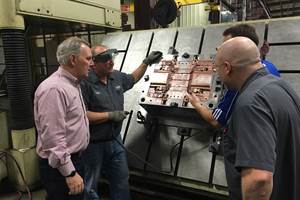Seven Reasons to Say “NO” to New Business
Make sure potential customers match your ideal customer profile before you take them on.
Whether you're a startup or a large corporation, taking on a new customer who doesn't match your ideal customer profile can be a big mistake. Here are seven situations that indicate you should say no to new business.
1. Your gut instinct says no.
Your gut instinct or intuition is the most powerful weapon you own that is always correct … even if it isn't always a logical thought. When you hear that little voice inside telling you to turn away the new business you should follow it or you could regret your decision later. Sometimes there doesn't have to even be a logical explanation why you don't trust the situation.
2. The customer does not appreciate the value of what you offer.
While some people make decisions based upon price, the most profitable business for your company will be from customers who appreciate the value of what you offer. Value could include your expertise, credibility, service, knowledge, reliability and guarantee. Anybody who selects your company based on price alone views you as a commodity, not a valued service.
3. The customer expects you to invest time and resources into pursuing their business without any financial commitment on their end.
Giving away products or services for free before the prospect makes any financial commitment diminishes the value of your company. It also raises the level of what they expect you to deliver beyond what you would normally offer for a specific price because they have already received something from you for free.
4. The customer does not treat you in a courteous or professional manner.
Profitable business is based on strong relationships between you and your customer. This doesn't mean your customer has to be your best friend, but in essence your best customers will be those who respect and value your professionalism. Anybody who constantly questions your recommendations, nit-picks at your pricing, or questions your credibility or judgment, is not interested in developing a long-term relationship with your business.
5. The customer asks for products or services you don't provide.
There are times when someone will approach your business for products and services you already provide and will also request additional products or services you don't already provide. They value your relationship and ask you if you would be willing to venture out into new opportunities. If this new opportunity is a stretch on your capital resources or your existing operational structure, or it is not congruent with the mission of your company, it is best to decline this business. Before you instantly accept a new challenge and opportunity make sure it will not stretch your resources and develop into more headaches than successes for your company.
6. The customer's requests are too large for your operation.
If a company approaches you to provide something that stretches beyond your current capabilities to produce, consider the cost to expand your operations versus the profit potential. Take into account any new capital expenditures, additional employees, training expenses, material costs and the opportunity costs of other business lost while you are meeting the needs of this new customer. Controlled growth for your company is more manageable and typically more profitable than a large increase in business within a short timeframe if you are not currently set up to manage that quick growth.
7. The customer does not share the same values as you.
The right customer for you is someone who shares your values. It will be very apparent by the manner in which the customer treats you if you share common values. Don't lose sight of your company's mission and values even if it means turning down potential business. When you compromise your values to pick up new business it will not result in profitable business for your company in the long run.
Related Content
Making Quick and Easy Kaizen Work for Your Shop
Within each person is unlimited creative potential to improve shop operations.
Read MoreMold Design Review: The Complete Checklist
Gerardo (Jerry) Miranda III, former global tooling manager for Oakley sunglasses, reshares his complete mold design checklist, an essential part of the product time and cost-to-market process.
Read MoreSteps for Determining Better Mold Prices
Improving your mold pricing requires a deeper understanding of your business.
Read MoreOEE Monitoring System Addresses Root Cause of Machine Downtime
Unique sensor and patent-pending algorithm of the Amper machine analytics system measures current draw to quickly and inexpensively inform manufacturers which machines are down and why.
Read MoreRead Next
Reasons to Use Fiber Lasers for Mold Cleaning
Fiber lasers offer a simplicity, speed, control and portability, minimizing mold cleaning risks.
Read MoreAre You a Moldmaker Considering 3D Printing? Consider the 3D Printing Workshop at NPE2024
Presentations will cover 3D printing for mold tooling, material innovation, product development, bridge production and full-scale, high-volume additive manufacturing.
Read More


















